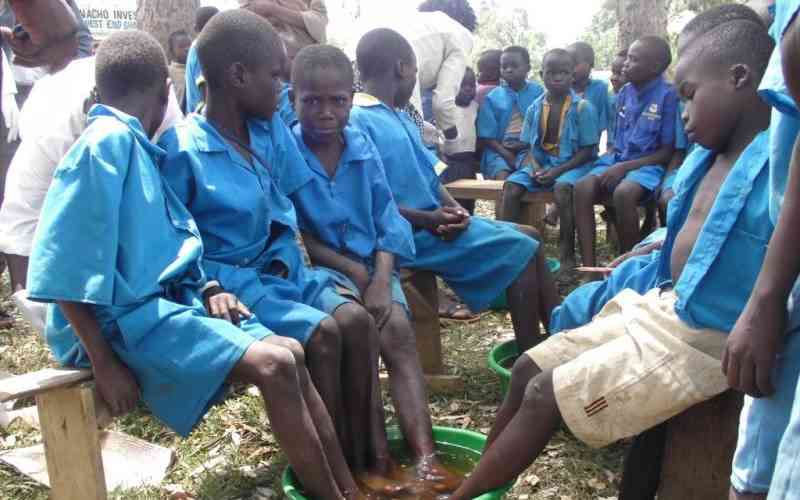
The ambitious implementation of the Primary Healthcare Networks (PCNs) as part of the Bottom-Up Economic Transformational Agenda (Beta) marks a crucial moment in the nation's medical care history. PCNs are local organisations set up to improve patient care in their regions and make primary healthcare more efficient and effective.
This initiative, driven by the national government in collaboration with counties and development partners, aims to revolutionise healthcare delivery by establishing a PCN in all 47 devolved units. This journey underscores Kenya's commitment to ensuring high-quality and affordable healthcare for all, thereby contributing to the global agenda of the Universal Health Coverage.
The PCN model goes beyond traditional healthcare delivery; it represents a holistic reimagining of healthcare services. These networks are poised to address most of an individual's health needs throughout their life, offering a more integrated, accessible, and practical approach to health and wellbeing. The successful implementation of PCNs could serve as a beacon for other low-and middle-income countries, demonstrating the profound impact of well planned, contextually adapted, and collaboratively executed healthcare strategies.
The model aligns with global health priorities, including the Sustainable Development Goals (SDGs), particularly Goal 3, which focuses on ensuring healthy lives and promoting well-being for all at all ages. It also addresses other related SDGs such as reducing inequalities and promoting gender equality by ensuring that women, children and the marginalised groups have better access to healthcare.
PCNs are especially critical in Kenya's healthcare challenges. Historically, the country has grappled with a range of health issues, from infectious diseases like HIV and Aids and malaria to a rising burden of non-communicable diseases. Moreover, there are significant healthcare access and quality disparities between urban and rural areas and different socio-economic groups. PCNs offer a chance to bridge these gaps by bringing quality healthcare closer to the people, particularly in underserved areas.
One of the key advantages of PCNs is their focus on preventive and curative care. Integrating these aspects, the model promises to improve health outcomes by preventing illnesses from occurring in the first place and treating them when they, unfortunately, do. This is particularly important in a country where many health issues are preventable through early interventions and lifestyle changes.
Moreover, the PCN model fosters a more patient-centred approach to healthcare. Focusing on the needs and circumstances of individual communities allows the networks to provide more tailored and effective health services. This approach is essential in a country as diverse as Kenya where healthcare needs can vary widely from one community to another.
At the heart of the PCN initiative is the principle of local governance. County ownership and commitment are essential for the successful rollout of these networks. Integrating PCNs into regional planning and securing the commitment of top leadership ensures that these networks are deeply rooted in the communities they serve. This approach transforms PCNs into more than healthcare facilities; they become community-centred hubs that reflect and respond to the specific health needs of the local populace.
Robust governance structures and accountability measures form the backbone of effective PCN management. Establishing robust governance systems and accountability mechanisms ensures transparency, community participation, and responsiveness. This governance transcends administrative functionality; it's about creating networks accountable to public health and trust stewards, responsive to the needs and well-being of the communities they serve.
Kenya's diverse geographic and socio-cultural landscape calls for a tailored approach to healthcare. Effective deployment of PCNs requires adaptable implementation models sensitive to each county's varying contexts. Recognising the unique challenges and needs of different regions, from the arid lands of the north to the highlands in the west, is essential. This flexibility in the PCN framework allows each network to provide relevant and impactful healthcare services, catering to the Kenyan population's diverse needs.
Another cornerstone of the PCN strategy is sustainable financing. Moving away from a reliance on development partner funding to robust, self-sustaining financial models is crucial for achieving primary health care targets. This shift involves strategic fund reallocation towards primary care networks, establishing detailed work plans to ensure optimal functionality of the networks, and adopting legislative measures for healthcare funding. Facility Financial autonomy is critical for the long-term viability and impact of the PCNs, ensuring they remain operational and practical for future generations.
Performance measurement and adaptive learning are integral to the success of PCNs. Developing frameworks for ongoing assessment and evidence generation tailored to the performance of these networks allows for continuous improvement and adaptation.
Tools like the Primary Health Care Network Observatory established by Amref Health Africa in collaboration with the Ministry of Health are vital in providing real-time updates on the rollout and impact of these networks, facilitating informed decision-making and adjustments where necessary.
The realisation of PCNs' whole potential hinges on multi-sectoral collaboration and partnerships. Bringing together various stakeholders, aligning resources, and fostering synergistic collaborations are crucial.
Opanga is research and impact advisor while Maina is a monitoring and evaluation officer at Amref Health Africa in Kenya
 The Standard Group Plc is a multi-media organization with investments in media
platforms spanning newspaper print
operations, television, radio broadcasting, digital and online services. The
Standard Group is recognized as a
leading multi-media house in Kenya with a key influence in matters of national
and international interest.
The Standard Group Plc is a multi-media organization with investments in media
platforms spanning newspaper print
operations, television, radio broadcasting, digital and online services. The
Standard Group is recognized as a
leading multi-media house in Kenya with a key influence in matters of national
and international interest.











